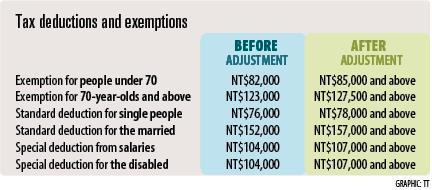Minister of Finance Chang Sheng-ford (張盛和) announced yesterday that the ministry will increase various income tax deductions and exemptions for taxpayers because consumer prices for the past three years have reached the tax reduction threshold.
The ministry will announce the final deductions and exemptions by the end of this month at the earliest. The new measures will be applied to the income taxpayers receive next year, with taxes to be reported and submitted in 2014.
Under the Income Tax Act (所得稅法), the Ministry of Finance has to adjust upward the amount of tax deductions and exemptions if the nation’s average headline inflation rate between November and October a year later rises by more than 3 percent compared with the level recorded when the tax was last reduced.

The composite consumer price index (CPI) averaged 108.76 points from November last year to last month and the Directorate-General of Budget, Accounting and Statistics (DGBAS) said the index had reached 110.34 last month.
The 108.76-point level was an increase of 3.47 percent from the average level recorded from November 2007 to October 2008, the year the ministry last adjusted the tax deduction and exemption amounts.
“All of these amounts have to be increased in line with the rising rate of headline inflation,” Chang said in a legislative question-and-answer session.
The ministry is expected to raise the exemption amount by NT$3,000 (US$103) for people below the age of 70 and by NT$4,500 for those aged 70 and above, while boosting the standard deduction amount by NT$2,000 for a single person and by NT$5,000 for married couples.
The special income tax deduction from salaries or wages and the special deduction for the disabled will be raised by NT$3,000 each.
The tax reduction plan may lower the nation’s tax revenue by between NT$6.8 billion and NT$7 billion a year, ministry data showed.
In related news, annual growth of the nation’s headline inflation rate slowed to 2.36 percent last month, from the 2.96 percent a month earlier, the DGBAS said in its monthly report.
However, it was the fourth straight month the CPI has grown by more than 2 percent from a year earlier, the report said.
Vegetable and fruit prices saw an 11.57 percent and 18.85 percent increase respectively from the previous year, the report’s data showed.
The increase further drove up the annual growth in overall food prices to 4.24 percent last month — the highest of the seven components in the index, statistics showed.
In the first 10 months of the year, the headline inflation rate rose 2 percent from a year earlier, according to the DGBAS’ data.
However, annual growth in headline inflation may remain lower than 2 percent this year, as vegetable and fruit prices continue to slide back to a steadier level for this month and next month, DGBAS section chief Wang Shu-chuan (王淑娟) said.
In addition, sluggish global economic sentiment has been dragging down prices of international raw materials and weakening consumption, both of which may further slow inflationary pressure in the near-term.

US President Donald Trump yesterday announced sweeping "reciprocal tariffs" on US trading partners, including a 32 percent tax on goods from Taiwan that is set to take effect on Wednesday. At a Rose Garden event, Trump declared a 10 percent baseline tax on imports from all countries, with the White House saying it would take effect on Saturday. Countries with larger trade surpluses with the US would face higher duties beginning on Wednesday, including Taiwan (32 percent), China (34 percent), Japan (24 percent), South Korea (25 percent), Vietnam (46 percent) and Thailand (36 percent). Canada and Mexico, the two largest US trading

AIR SUPPORT: The Ministry of National Defense thanked the US for the delivery, adding that it was an indicator of the White House’s commitment to the Taiwan Relations Act Deputy Minister of National Defense Po Horng-huei (柏鴻輝) and Representative to the US Alexander Yui on Friday attended a delivery ceremony for the first of Taiwan’s long-awaited 66 F-16C/D Block 70 jets at a Lockheed Martin Corp factory in Greenville, South Carolina. “We are so proud to be the global home of the F-16 and to support Taiwan’s air defense capabilities,” US Representative William Timmons wrote on X, alongside a photograph of Taiwanese and US officials at the event. The F-16C/D Block 70 jets Taiwan ordered have the same capabilities as aircraft that had been upgraded to F-16Vs. The batch of Lockheed Martin

GRIDLOCK: The National Fire Agency’s Special Search and Rescue team is on standby to travel to the countries to help out with the rescue effort A powerful earthquake rocked Myanmar and neighboring Thailand yesterday, killing at least three people in Bangkok and burying dozens when a high-rise building under construction collapsed. Footage shared on social media from Myanmar’s second-largest city showed widespread destruction, raising fears that many were trapped under the rubble or killed. The magnitude 7.7 earthquake, with an epicenter near Mandalay in Myanmar, struck at midday and was followed by a strong magnitude 6.4 aftershock. The extent of death, injury and destruction — especially in Myanmar, which is embroiled in a civil war and where information is tightly controlled at the best of times —

China's military today said it began joint army, navy and rocket force exercises around Taiwan to "serve as a stern warning and powerful deterrent against Taiwanese independence," calling President William Lai (賴清德) a "parasite." The exercises come after Lai called Beijing a "foreign hostile force" last month. More than 10 Chinese military ships approached close to Taiwan's 24 nautical mile (44.4km) contiguous zone this morning and Taiwan sent its own warships to respond, two senior Taiwanese officials said. Taiwan has not yet detected any live fire by the Chinese military so far, one of the officials said. The drills took place after US Secretary